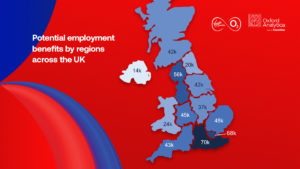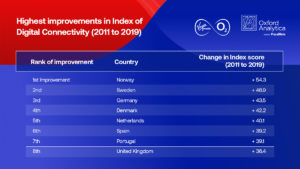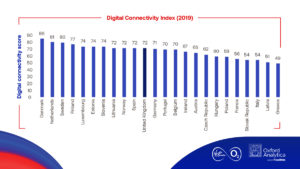- Investment in UK digital infrastructure could create 510,000 new jobs and add £70 billion to UK GDP over the next five years
- More than 85% of new jobs created could be located outside of London in a boost for UK regions
- New research for Virgin Media O2 shows clear link between investment in digital connectivity and national economic growth, and comes as the company nears completion of its gigabit rollout
- UK ranked 8th amongst OECD countries in Digital Connectivity Index – with opportunity to become global leader in coming years
Investment in full fibre and mobile connectivity could unlock more than 500,000 jobs by 2026 and help tackle inequality according to new research from Virgin Media O2 and economic modelling experts Oxford Analytica.
The findings are revealed in the first ever Digital Connectivity Index which uses thousands of OECD datapoints to measure how individuals and organisations can connect with one another and the rest of the world through high-quality internet access. The Index, the first of its kind, assesses the quality of connectivity infrastructure across OECD countries and finds the UK is currently ranked joint 8th out of 24 OECD countries publishing complete digital connectivity datasets – well into the top half of countries scored and just ahead of Germany, Portugal and Ireland.
The Digital Connectivity Index also reveals how upgrading mobile and broadband networks can support economic growth and help the country to level up. If the UK were to become the OECD leader, it may unlock:
- £69.78 billion in extra GDP between now and 2026.
- 510,000 new jobs between now and 2026.
- Consistently higher economic growth rates every year: The UK’s GDP growth rate would be almost a full percentage point higher (0.88) by 2026.
Every UK region could benefit with more than 85% of new jobs created outside of London. The North West may see as many as 56,000 new jobs created; while The Midlands and Scotland could benefit from an additional 82,000 and 42,000 roles, respectively. Small and medium sized businesses could be amongst the main winners, creating the lion’s share of the new roles.
Regional economies could see huge boosts too, with gains worth £4.65bn to Yorkshire, £2.46bn to Wales, £5.19bn to the South West and £1.61bn to Northern Ireland.
Lutz Schüler, Chief Executive Officer of Virgin Media O2, said:
“The importance of digital connectivity to the UK’s future couldn’t be clearer, and the role we play as an industry more profound.
“With economic growth, new jobs and a fairer society at stake, we’re already taking a lead with a commitment to invest £10 billion over the next five years.
“We’re turning up the dial on the national recovery and helping the country to climb up the international connectivity league tables to create a brighter, more prosperous future for every corner of the UK.”
Scott Urban, Senior Advisor at Oxford Analytica, said:
“The Digital Connectivity Index shows telecom’s key contribution to levelling-up through spurring higher growth and creating new jobs.”
The research has been commissioned by Virgin Media O2, as part of its mission to upgrade the UK. The company has committed to investing at least £10 billion over the next five years, with plans to expand 5G coverage to cover 50% of the population by 2023 and upgrade its entire fixed network to full fibre to the premises by 2028.
This is alongside the company’s continued gigabit rollout which will see 1.1Gbps speeds delivered across its entire broadband network before the end of the year.
Addressing the digital divide
Whilst the research shows that the UK has improved its level of digital connectivity well above the OECD average between 2011 and 2019, addressing the UK’s digital divide is key to making further gains.
The findings reveal that people living in more deprived areas of the country, in rural areas and lower income households are most at risk of digital exclusion. As many as 1 in 10 of those with a household income of £15,000 a year or less do not have an internet connection at home, whilst those living in rural areas are twice as likely to report suffering from poor internet connections as those living in urban areas.
To help address digital poverty, in July 2021 Virgin Media O2 played a leading role in launching the UK’s first ever National Databank – providing free mobile data to people in need. Through the databank, 7.5 million GB of O2 mobile data will be donated to help over 200,000 people get connected by the end of 2023, with other mobile operators also able to contribute data to the platform.
This is alongside Virgin Media’s Help for Home Learners initiative and O2’s Community Calling programme which provided data and devices to support vulnerable customers during the Covid-19 pandemic, and Virgin Media’s Essential Broadband service for customers who are struggling financially and receiving Universal Credit.
Through its Project Lightning programme, the company is also expanding its network to reach more communities nationwide and has built to 2.5 million additional homes and businesses since 2015, giving them access to the UK’s fastest widely available broadband network.
This is as well as collaborating with Government and other mobile providers to deliver a Shared Rural Network (SRN) which will see 4G coverage rise from the current level of 66% to 84%; all operators cover at least 90% of UK landmass and 4G services reaching an additional 280,000 premises and 10,000 miles of roads by 2026.
Notes to Eds:
Regional analysis assumes additional GDP and jobs will be split in the same way GDP and population is currently split in the UK.
- Map of jobs per region

- Map of GDP per region

- OECD countries ranked table.

press enquiries
press enquiries







